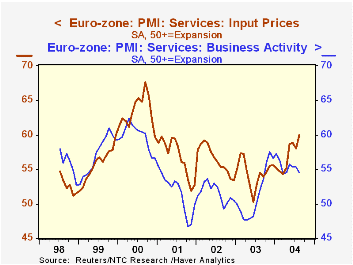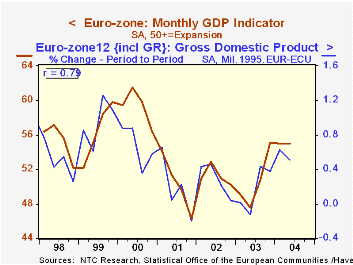 Global| Sep 03 2004
Global| Sep 03 2004Euro-Zone Services Activity Maintains Steady Growth
Summary
The Euro-Zone Purchasing Managers Index for the service industries edged down in August to 54.47 from 55.31 in July. A narrow range from 54.40 to 55.76 has prevailed for six months now, tracing a steady moderate growth path for [...]

The Euro-Zone Purchasing Managers Index for the service industries edged down in August to 54.47 from 55.31 in July. A narrow range from 54.40 to 55.76 has prevailed for six months now, tracing a steady moderate growth path for service sector activity. These international PMI surveys are conducted by NTC-Research for Reuters, Inc.
Most individual countries have also seen minimal swings in these service industry gauges. That in Germany, a few points lower than most, has crept higher the last few months. In Italy, the opposite is true: its index was over 58 in June, but has slowed to 56.5 in August. Components for the Euro-Zone Total show that employment is picking up while new orders are showing a bit less growth. Expectations have been virtually unchanged over the summer months. Input prices, as seen in the first graph, continue to move ahead.
NTC-Research compiles purchasing manager indexes for the Euro-Zone and other countries for the manufacturing, construction and service sectors of each economy. The firm recently introduced a set of "GDP Indicators" which combines these three sectoral indexes into a weighted average of the three diffusion indexes. NTC analysts then use regression models to scale the index to GDP growth rates.
For the Euro-Zone, the index eased too in August, although it stands several percentage points above year-ago levels. For assessing year-to-year growth prospects, the NTC PMI-based indicator's translation to year-to-year growth aligns fairly well with GDP performance and has a high correlation ratio of 93%. The indicator level runs a 79% correlation with quarterly changes in Euro-Zone GDP. The recent moves in the indicator suggest a further gain in Euro-Zone GDP of 0.5 to 0.6% this quarter and year-on-year expansion of about 2-1/4%, that is, at least maintaining its recent growth rates.
| Purchasing Managers Index Percent (>50 = expansion; <50 = contraction) |
Aug 2004 | July 2004 | June 2004 | Aug 2003 | 2003 | 2002 | 2001 |
|---|---|---|---|---|---|---|---|
| Services: | |||||||
| Euro Zone Total | 54.47 | 55.31 | 55.31 | 51.99 | 51.36 | 51.58 | 51.63 |
| Germany | 53.54 | 53.87 | 52.30 | 51.78 | 48.49 | 48.62 | 48.87 |
| United Kingdom | 56.91 | 56.22 | 56.77 | 57.00 | 54.84 | 54.37 | 51.41 |
| GDP Indicator: | |||||||
| Euro-Zone Total | 54.5 | 55.5 | 55.0 | 50.8 | 50.6 | 51.3 | 50.4 |
| Year/Year % Change | 2.2 | 2.2 | 2.3 | 0.4 | 0.8 | 1.0 | 1.5 |
| Actual GDP Growth, Year/Year | 0.5 | 0.9 | 1.6 |
Carol Stone, CBE
AuthorMore in Author Profile »Carol Stone, CBE came to Haver Analytics in 2003 following more than 35 years as a financial market economist at major Wall Street financial institutions, most especially Merrill Lynch and Nomura Securities. She had broad experience in analysis and forecasting of flow-of-funds accounts, the federal budget and Federal Reserve operations. At Nomura Securities, among other duties, she developed various indicator forecasting tools and edited a daily global publication produced in London and New York for readers in Tokyo. At Haver Analytics, Carol was a member of the Research Department, aiding database managers with research and documentation efforts, as well as posting commentary on select economic reports. In addition, she conducted Ways-of-the-World, a blog on economic issues for an Episcopal-Church-affiliated website, The Geranium Farm. During her career, Carol served as an officer of the Money Marketeers and the Downtown Economists Club. She had a PhD from NYU's Stern School of Business. She lived in Brooklyn, New York, and had a weekend home on Long Island.
More Economy in Brief
 Global| Feb 05 2026
Global| Feb 05 2026Charts of the Week: Balanced Policy, Resilient Data and AI Narratives
by:Andrew Cates





